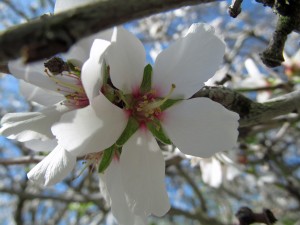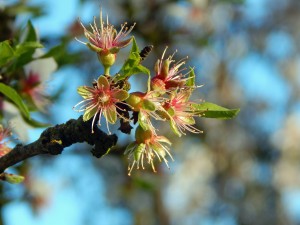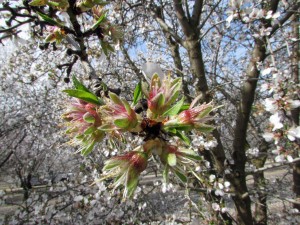
Director, Member Relations
This report covers conditions and observations made on Tuesday, February 23, 2016.
Northern Region –
More beautiful weather graced the Sacramento Valley on Tuesday as bloom is quickly coming to its conclusion. Overnight temperatures in the low 40s quickly gave way to afternoon highs in the upper 60s with some areas breaking into the low 70s. Clear skies and calm winds made for another great day of bee activity as bees were able to put in 7 solid hours of work.
Petals continue to shed on all varieties on the northern region. The early blooming Sonora has almost no petals remaining and green leaf tissue is emerging. Nonpareil, Monterey, and California-type pollenizers have under ten percent of their flowers presenting for pollination while around two-thirds of the flowers have shed all of their petals. Carmel remains a day behind Nonpareil. The late blooming Butte and Padre have just over one-quarter of their flowers presenting for pollination with another quarter of their flowers having shed all of their petals.
Growers are beginning to apply fertilizer through their irrigation water as trees are starting to pull moisture and nutrients from the soil. Beekeepers will begin to take hives out of the fields next week as bloom continues to wind down.
| Northern Region | |
| Date | 2/23/2016 |
| Temperature | |
| High | Low |
| 69 | 41 |
| Wind Speed | 4 to 6 mph |
| Clouds | Clear |
| Bee Activity | 6 to 8 Hours / Very Good |
|
Bloom Stages |
|||||||||
| Percentages | Dormant | Green Tip | Pink Bud | Popcorn | Bloom | Petal Fall | Jacket | Nutlet | Total |
| Sonora | 5 | 95 | 100 | ||||||
| Nonpareil | 7 | 33 | 60 | 100 | |||||
| California | 6 | 25 | 69 | 100 | |||||
| Carmel | 15 | 45 | 40 | 100 | |||||
| Peerless | 1 | 99 | 100 | ||||||
| Monterey | 9 | 22 | 69 | 100 | |||||
| Butte | 26 | 46 | 28 | 100 | |||||
| Padre | 29 | 45 | 26 | 100 | |||||
| Winters | 5 | 95 | 100 | ||||||
Central Region –
Warm, sunny weather filled the Northern San Joaquin Valley once again, as overnight temperatures in the low 40s yielded to afternoon highs in the upper 60s. Clear skies and calm winds allowed bees to work for 7 solid hours.
Bloom continues it decent from maximum number of open flowers in the central region. The early blooming Sonora now has very few viable flowers presenting for pollination while most of the flowers have shed all of their petals. Nonpareil, Monterey, and California-type pollenizers have under one-fifth of their flowers presenting for pollination although most do not contain viable pollen. Calm winds have caused petals to hang on longer than they should, and Carmel continues to track a day behind Nonpareil. The late blooming Butte and Padre are shedding petals at a slightly slower rate and are now 3 to four days behind Nonpareil.
Growers are beginning to apply fertilizer to orchards as trees are starting to pull nutrients from the soil. Flail mowing continues between tree rows as growers try to manage orchard temperature by keeping vegetation close to the ground.
| Central Region | |
| Date | 2/23/2016 |
| Temperature | |
| High | Low |
| 69 | 39 |
| Wind Speed | 4 to 6 mph |
| Clouds | Clear |
| Bee Activity | 7 Hours / Very Good |
|
Bloom Stages |
|||||||||
| Percentages | Dormant | Green Tip | Pink Bud | Popcorn | Bloom | Petal Fall | Jacket | Nutlet | Total |
| Sonora | 6 | 23 | 71 | 100 | |||||
| Nonpareil | 16 | 44 | 40 | 100 | |||||
| California | 15 | 43 | 42 | 100 | |||||
| Carmel | 27 | 36 | 37 | 100 | |||||
| Monterey | 18 | 44 | 38 | 100 | |||||
| Butte | 41 | 33 | 26 | 100 | |||||
| Padre | 53 | 35 | 12 | 100 | |||||
Southern Region –
Sunshine and clear skies filled the South San Joaquin Valley on Tuesday. Overnight temperatures in the low 40s yielded to daytime highs in the low 70s. Mostly clear skies and calm winds allowed bees to put in 7 hours of very concentrated work.
Bloom is winding down in the southern region. Almost half of the flowers on the early blooming Sonora have shed all of their petals while only one-fifth of the flowers are presenting for pollination. Nonpareil, Monterey, Carmel, and California-type pollenizers are a little over a day behind Sonora and shedding petals quickly. The late blooming Butte and Padre are holding on to their petals better than the early bloomers. They still have around half or more of their flowers presenting for pollination. Varieties within individual orchards continue to have excellent overlap giving bee plenty of opportunities for cross pollination where flowers are still viable.
Growers with access to water are irrigating and applying nutrients through their irrigation system as trees begin to pull moisture and nutrients from the soil. Floor management continues as growers try to regulate orchard temperature in case of cold weather by keeping vegetation close to the ground.
| Southern Region | |
| Date | 2/23/2016 |
| Temperature | |
| High | Low |
| 70 | 41 |
| Wind Speed | 5 mph |
| Clouds | High, Thin |
| Bee Activity | 7 to 8 Hours / Very Good |
|
Bloom Stages |
|||||||||
| Percentages | Dormant | Green Tip | Pink Bud | Popcorn | Bloom | Petal Fall | Jacket | Nutlet | Total |
| Sonora | 21 | 30 | 49 | 100 | |||||
| Nonpareil | 34 | 30 | 36 | 100 | |||||
| California | 28 | 38 | 34 | 100 | |||||
| Carmel | 38 | 30 | 32 | 100 | |||||
| Monterey | 30 | 37 | 33 | 100 | |||||
| Butte | 49 | 42 | 9 | 100 | |||||
| Padre | 63 | 35 | 2 | 100 | |||||


